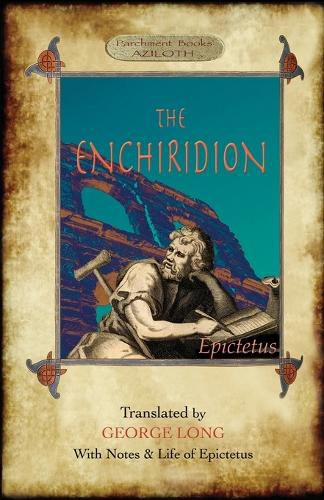Readings Newsletter
Become a Readings Member to make your shopping experience even easier.
Sign in or sign up for free!
You’re not far away from qualifying for FREE standard shipping within Australia
You’ve qualified for FREE standard shipping within Australia
The cart is loading…






This title is printed to order. This book may have been self-published. If so, we cannot guarantee the quality of the content. In the main most books will have gone through the editing process however some may not. We therefore suggest that you be aware of this before ordering this book. If in doubt check either the author or publisher’s details as we are unable to accept any returns unless they are faulty. Please contact us if you have any questions.
Among the classical Greco-Roman philosophers none are more influential than the first century Stoic, Epictetus, and the core of his teachings is found in The Enchiridion, or handbook.
Epictetus was the slave of an officer in Nero’s imperial guard. He became schooled in Stoicism and after obtaining his freedom, brought his own insights to bear on the precepts of this life-changing philosophy, lecturing first in Rome and then in Nicopolis where he spent the rest of his life. Like so many early philosophers, he did not put pen to parchment and were it not for one of his students, Arrian, his sage and practical advice on how to live a tranquil life would have been lost to us.
The Enchiridion sets out the principles of stoic moral philosophy as a way of life and the basis of happiness. We should not try to change events that are beyond our control and seek only to control our own thoughts and actions through self-knowledge. Rooted in ethics, logic and natural laws, Epictetus’ guidelines emphasise that No man is free who is not master of himself, a challenge that many latter-day greats like Marcus Aurelius recognised as a worthy goal.
This little book deserves several re-reads to fully appreciate the hard simplicity of Epictetus’ wisdom.
$9.00 standard shipping within Australia
FREE standard shipping within Australia for orders over $100.00
Express & International shipping calculated at checkout
This title is printed to order. This book may have been self-published. If so, we cannot guarantee the quality of the content. In the main most books will have gone through the editing process however some may not. We therefore suggest that you be aware of this before ordering this book. If in doubt check either the author or publisher’s details as we are unable to accept any returns unless they are faulty. Please contact us if you have any questions.
Among the classical Greco-Roman philosophers none are more influential than the first century Stoic, Epictetus, and the core of his teachings is found in The Enchiridion, or handbook.
Epictetus was the slave of an officer in Nero’s imperial guard. He became schooled in Stoicism and after obtaining his freedom, brought his own insights to bear on the precepts of this life-changing philosophy, lecturing first in Rome and then in Nicopolis where he spent the rest of his life. Like so many early philosophers, he did not put pen to parchment and were it not for one of his students, Arrian, his sage and practical advice on how to live a tranquil life would have been lost to us.
The Enchiridion sets out the principles of stoic moral philosophy as a way of life and the basis of happiness. We should not try to change events that are beyond our control and seek only to control our own thoughts and actions through self-knowledge. Rooted in ethics, logic and natural laws, Epictetus’ guidelines emphasise that No man is free who is not master of himself, a challenge that many latter-day greats like Marcus Aurelius recognised as a worthy goal.
This little book deserves several re-reads to fully appreciate the hard simplicity of Epictetus’ wisdom.